TheLostSwede
News Editor
- Joined
- Nov 11, 2004
- Messages
- 17,640 (2.41/day)
- Location
- Sweden
| System Name | Overlord Mk MLI |
|---|---|
| Processor | AMD Ryzen 7 7800X3D |
| Motherboard | Gigabyte X670E Aorus Master |
| Cooling | Noctua NH-D15 SE with offsets |
| Memory | 32GB Team T-Create Expert DDR5 6000 MHz @ CL30-34-34-68 |
| Video Card(s) | Gainward GeForce RTX 4080 Phantom GS |
| Storage | 1TB Solidigm P44 Pro, 2 TB Corsair MP600 Pro, 2TB Kingston KC3000 |
| Display(s) | Acer XV272K LVbmiipruzx 4K@160Hz |
| Case | Fractal Design Torrent Compact |
| Audio Device(s) | Corsair Virtuoso SE |
| Power Supply | be quiet! Pure Power 12 M 850 W |
| Mouse | Logitech G502 Lightspeed |
| Keyboard | Corsair K70 Max |
| Software | Windows 10 Pro |
| Benchmark Scores | https://valid.x86.fr/yfsd9w |
Some of you might be old enough to remember various "RAM doubling" software software solutions that appeared back in the late 1980's for Apple, as well as in the mid 90's for Windows 95 computers. Most of them never really delivered on their claims, but now it looks like we might be getting something similar, albeit in hardware.
Swedish company ZeroPoint Technology AB has announced that it has raised €2.5 million in a seed round to bring its Ziptilion patented memory compression technology IP to the market. ZeroPoint claims a compression ratio of two to three times depending on the workload, which seems very impressive. Unlike current software compression technologies such as ZSWAP or ZRAM that are used to compress data in RAM at a rate of 1.4 to 1.5 times, ZeroPoint promises that it's hardware IP won't have any real world negative effects on system performance. In fact, they claim it'll only cause one nanosecond of extra latency when writing data and 100 nanoseconds delay when it comes to reading the compressed data from RAM.
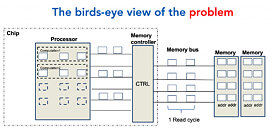
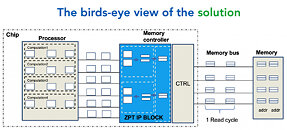
Ziptilion has already been implemented into a product using TSMC's 28 nm node, using an AXI bus at 800 MHz, which resulted in a memory throughput of 32 GB/s. It's not clear what product this is, but based on the manufacturing node it suggests it might just be an ARM based test platform. ZeroPoint claims that its IP is easy to integrate with existing hardware designs, as it's placed on the memory access path and thus doesn't require changes to the memory controller itself, although it does require a software device driver element which might limit some potential applications.
In something like a normal desktop computer on a 7 nm node, the Ziptilion IP is expected to only use up about 1.36 square millimetres for a standard dual-channel RAM configuration. On a server CPU with 8-channels of RAM, this is estimated to increase to about 3.02 square milimetres. ZeroPoint is expecting it's IP to find its way into servers, embedded systems and smartphone SoCs to start with and the company is already working on its next generation Ziptiolion+ technology which appears to further increase the compression factor depending on the specific target application. Not all kinds of data compress the same, based on ZeroPoint's whitepaper.
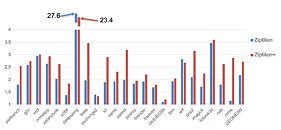
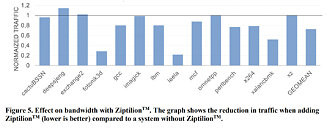
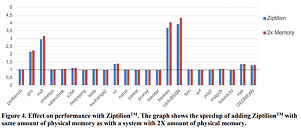
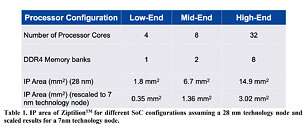
The boldest claim made by ZeroPoint is that they claim you'll see the same system performance gains in most of their tested scenarios, as you would from doubling your system RAM. In addition to this, ZeroPoint also claims to increase the effective memory bandwidth in a system, due to the compressed data taking up less bandwidth when being transferred between the RAM and the CPU. The whitepaper also seems to hint at the possibility of Ziptilion being used with GPUs, at least in something like an SoC, where the RAM is shared between the CPU and GPU.
It all sounds a little bit too good to be true, but the company has been researching its memory compression algorithms for the past 15 years, so it doesn't sound like a money grabbing scam, unlike the RAM doubling software back in the day.
View at TechPowerUp Main Site
Swedish company ZeroPoint Technology AB has announced that it has raised €2.5 million in a seed round to bring its Ziptilion patented memory compression technology IP to the market. ZeroPoint claims a compression ratio of two to three times depending on the workload, which seems very impressive. Unlike current software compression technologies such as ZSWAP or ZRAM that are used to compress data in RAM at a rate of 1.4 to 1.5 times, ZeroPoint promises that it's hardware IP won't have any real world negative effects on system performance. In fact, they claim it'll only cause one nanosecond of extra latency when writing data and 100 nanoseconds delay when it comes to reading the compressed data from RAM.


Ziptilion has already been implemented into a product using TSMC's 28 nm node, using an AXI bus at 800 MHz, which resulted in a memory throughput of 32 GB/s. It's not clear what product this is, but based on the manufacturing node it suggests it might just be an ARM based test platform. ZeroPoint claims that its IP is easy to integrate with existing hardware designs, as it's placed on the memory access path and thus doesn't require changes to the memory controller itself, although it does require a software device driver element which might limit some potential applications.
In something like a normal desktop computer on a 7 nm node, the Ziptilion IP is expected to only use up about 1.36 square millimetres for a standard dual-channel RAM configuration. On a server CPU with 8-channels of RAM, this is estimated to increase to about 3.02 square milimetres. ZeroPoint is expecting it's IP to find its way into servers, embedded systems and smartphone SoCs to start with and the company is already working on its next generation Ziptiolion+ technology which appears to further increase the compression factor depending on the specific target application. Not all kinds of data compress the same, based on ZeroPoint's whitepaper.




The boldest claim made by ZeroPoint is that they claim you'll see the same system performance gains in most of their tested scenarios, as you would from doubling your system RAM. In addition to this, ZeroPoint also claims to increase the effective memory bandwidth in a system, due to the compressed data taking up less bandwidth when being transferred between the RAM and the CPU. The whitepaper also seems to hint at the possibility of Ziptilion being used with GPUs, at least in something like an SoC, where the RAM is shared between the CPU and GPU.
It all sounds a little bit too good to be true, but the company has been researching its memory compression algorithms for the past 15 years, so it doesn't sound like a money grabbing scam, unlike the RAM doubling software back in the day.
View at TechPowerUp Main Site






